Resources
7 May 2023
6:30pm
Don't give up!
The last time I spoke on a university mission was in Cambridge, and my hero of the week was a Chinese student I got to know called Wun-jen, because she invited a different friend to each of the seven evening events. And each friend said ‘Yes’ they’d come, and each friend stood her up on the night and didn’t show. And I saw her after the talk on the last night, and she told me she’d been stood up for the seventh time. And I said ‘Wun-jen, I’m really sorry.’ and she said ‘Well don’t feel sorry for me. I’m just feeling sorry that my friends still haven’t heard what they need to hear.’ and I thought ‘You are my hero of the week.’ because that’s the attitude, isn’t it? To keep trying to tell people about Jesus, even when they don’t want to hear – because you know they need Jesus. And that’s the attitude we’re going to learn from Paul tonight as we carry on our series in Acts. So, before we go further, let me lead us in prayer…
So would you take one of the Bibles in the seats and turn to page 926, and that will get you to Acts 17. We’ve spent three weeks in Acts 16, which is about how the apostle Paul brought the gospel to Europe. That began in a city called Philippi, where we saw last week how Paul was wrongfully beaten and imprisoned because people didn’t like what he was doing. After which most of us would at least have grabbed a lastminute.com break on the nearest Greek island – if not reconsidered our career. Whereas Paul and co. still bruised and stiff, hopped on donkeys to cover the 100 miles to the next strategic city – Thessalonica. So look down to Acts 17.1-2:
Now when they had passed through Amphipolis and Apollonia, they came to Thessalonica, where there was a synagogue of the Jews. And Paul went in, as was his custom, and on three Sabbath days he reasoned with them from the Scriptures…
And that’s lesson number one from Paul tonight when it comes to trying to tell people about Jesus. Which is that:
1. Paul kept trying with people who responded negatively – and so should we
Just listen to these verses from earlier in Acts, about how Paul’s fellow-Jews responded to him trying to tell them about Jesus (Acts 9.22-25):
…[Paul]…confounded the Jews…in Damascus by proving that Jesus was the Christ. [So] when many days had passed, the Jews plotted to kill him…but his disciples took him by night and let him down through an opening in the [city] wall, lowering him in a basket.
Then Acts 13.50, after speaking in the synagogue at Antioch:
…the Jews…stirred up persecution against Paul and Barnabas, and drove them out of their district.
After Antioch Paul speaks in the synagogue at Iconium – and Acts 14.5-7:
When an attempt was made by both Gentiles and Jews…to mistreat…and…stone them, they…fled to Lystra and Derbe…and…continued to preach the gospel.
Then Acts 14.19-21 – in Lystra:
…Jews came from Antioch and Iconium, and having persuaded the crowds, they stoned Paul and dragged him out of the city, supposing that he was dead. But when the disciples gathered about him, he rose up and entered the city, and on the next day he went on…to Derbe. [And]…preached the gospel to that city…
Acts 17 is then the next time recorded in Acts when Paul has the chance to speak to a synagogue. And Acts 17.2 again:
…Paul went in, as was his custom [that was his policy: take the gospel to my fellow-Jews first], and on three Sabbath days he reasoned with them from the Scriptures
And I guess you or I might well have re-thought that policy, but Paul never did because he was like my Chinese friend Wun-Jen – only plus, plus, plus. Paul kept trying with people who responded negatively. And he did that because he knew they needed Jesus, and we see that as we read on. So, from Acts 17.2-3 again:
…Paul went in, as was his custom, and on three Sabbath days he reasoned with them from the Scriptures [in other words, the Old Testament part of the Bible], explaining and proving that it was necessary for the Christ to suffer and to rise from the dead, and saying, “This Jesus, whom I proclaim to you, is the Christ.”
So Paul was talking to people who knew the Old Testament, but he didn’t assume they understood it. Which is a golden rule for talking to people about Jesus. Don’t assume anything. And even if someone has some Bible knowledge (even from a Christian home) don’t assume they understand it. So for example at Word Alive this year I caught up with an ex-Newcastle student who’s now a pastor. He came from a Christian home, and I read the Bible with him 1-to-1, and I deliberately began with some really basic Bible studies called Just For Starters – which assume nothing. And after the first one, on being justified by faith, he said ‘I think I’ve just understood that for the first time.’ So here in Acts 17, Paul knew he could assume that his fellow-Jews knew about this figure called the Christ because back in the Old Testament, God had promised he would one day send the Christ to put right what had gone wrong with the world. But Paul also knew he could assume that his fellow-Jews would have misunderstood how the Christ was going to do that.
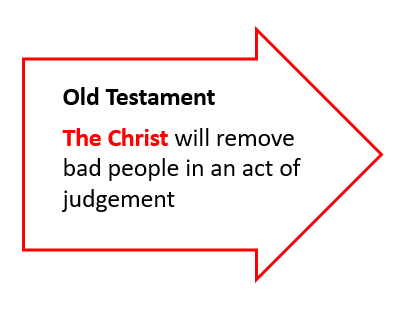
So here’s the picture of what they’d have thought. They’d have thought ‘The Christ will remove bad people in an act of judgement.’
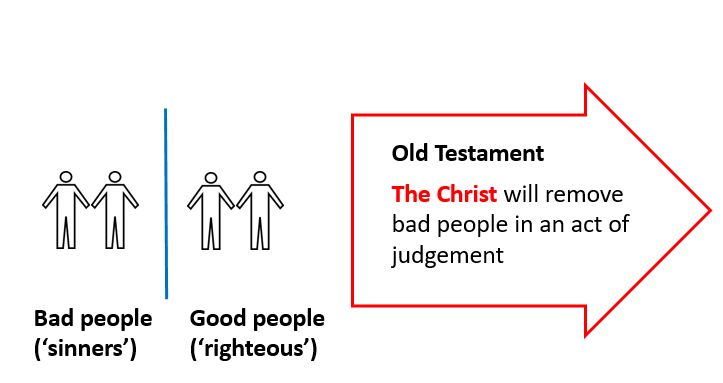
Because they thought there were two kinds of people in the world: good people like them, who were OK (or righteous) in God’s eyes;
and bad people (or sinners) who are what’s wrong with the world.
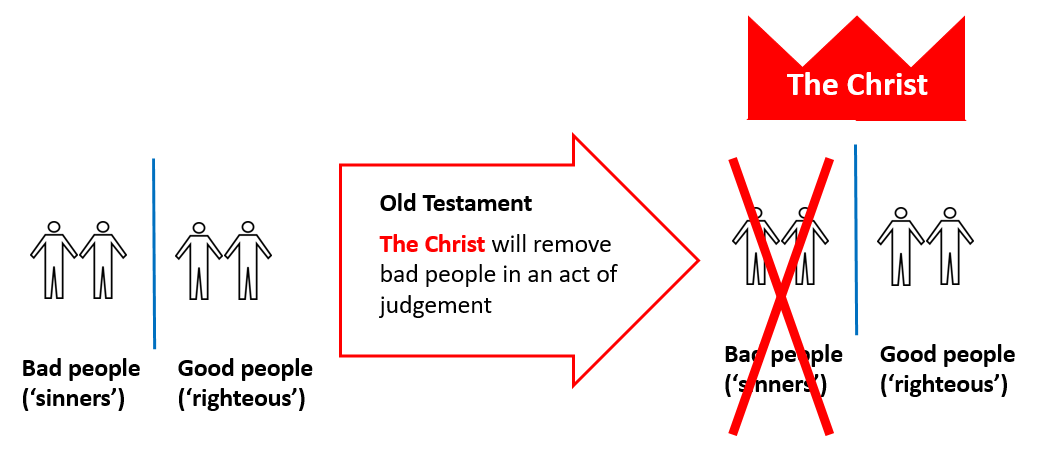
So (next picture) they thought: all that’s needed to put the world right is simply for the Christ to get rid of the bad people. And the idea that there are two kinds of people (the good enough for God and the bad enough to deserve judgement) is still around today, isn’t it? So you hear it when people say things like ‘I’ve always tried to live a good life’ or ‘I’ve never done anyone any harm.’ Which are ways of saying, ‘I’m in the good camp.’ And you hear it when people say things like, ‘Isn’t that rapist policeman so evil?’ or, ‘Wouldn’t it be good if Putin got a bullet in the head?’ Which are ways of saying, ‘They’re in a completely different camp from me.’ But the Bible says: There aren’t two kinds of people, but one. And it says that, consciously or subconsciously, we’ve all said to God, ‘I don’t want you running my life – I want to live it my own way.’ And some reject God’s rule in a more extreme way – so they look relatively bad. While others reject God’s rule in a less extreme way – so they look relatively good, but we’re all God-rejecters; so none of us is what we should be; and that brings us all under God’s judgement. Which begs the question: if he wants to, how can God forgive us, and give us the chance to be back in relationship with him – without compromising his justice?
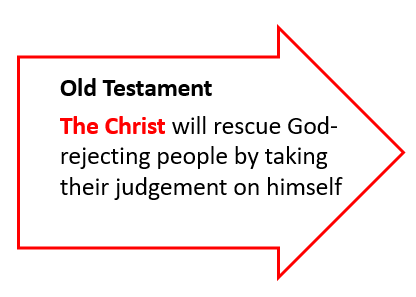
And here’s the Old Testament’s answer. It said: what the Christ will really do is rescue God-rejecting people by taking their judgement on himself. And the Old Testament passage that puts that most clearly is the one we read earlier (Isaiah 53.1-6). So listen to Isaiah 53.5-6 again. This is a prophecy of what the Christ would do, written 700 years before the event – and so sure was it to happen that Isaiah put it in the past tense, as if to say, ‘Since this is God’s plan, it’s as good as done.’
But he [the Christ] was wounded for our transgressions;he was crushed for our iniquities;upon him was the chastisement [ie, judgement] that brought us peace,and with his stripes we are healed.All we like sheep have gone astray;we have turned—every one—to his own way;and the Lord has laid on himthe iniquity of us all.
And further on, Isaiah 53 prophecies the Christ’s resurrection as well. So, now look back at Acts 17.2-3:
…Paul went in, as was his custom, and on three Sabbath days he reasoned with them from the Scriptures [from Old Testament passages like Isaiah 53], explaining and proving that it was necessary for the Christ to suffer and to rise from the dead
Because that’s what Paul’s fellow-Jews would not have understood from the Old Testament. They’d have thought it was necessary simply for the Christ to remove bad people in an act of judgement. Whereas God said it was actually necessary for the Christ to rescue God-rejecting people, by suffering their judgement for them (paying it off and then rising again from the dead), So that they could be forgiven without God compromising his justice. And Paul says here to his fellow-Jews ‘That’s what you should have been expecting the Christ to do, from the Old Testament. And since that’s what Jesus did – he must be the Christ.’ Acts 17.3 again, Paul was:
explaining and proving that it was necessary for the Christ to suffer and to rise from the dead, and saying, “This Jesus, whom I proclaim to you, is the Christ.”
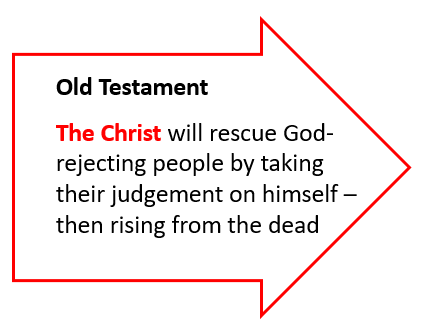
So back to my picture. The Old Testament said the Christ will rescue God-rejecting people by taking their judgement on himself, then rising from the dead.
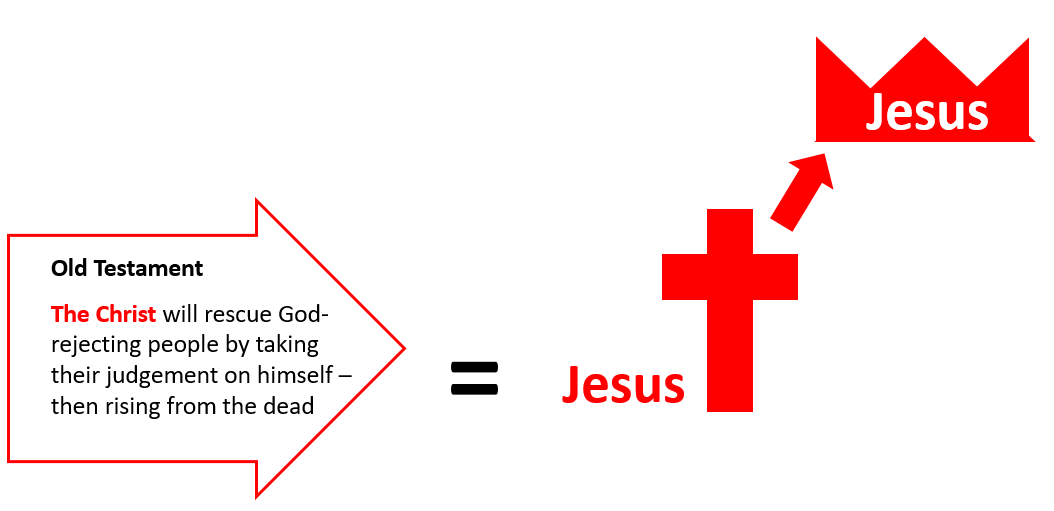
And (next picture) there’s the equation that Paul makes with Jesus: Jesus died under God’s judgement on the cross, and Jesus rose from the dead to show he’d paid off that judgement for us. So Jesus is the Christ the Old Testament was pointing forward to, and that’s why Paul kept trying to share the gospel with his fellow-Jews despite the fact that they mostly responded so negatively. It’s because he knew they needed Jesus as much as anyone. They didn’t think they did – because they thought they were in the good camp, the camp of people who are already OK with God. And that’s what people who belong to a religion often think, and it’s what we’re tempted to think about them, too. So I remember my Mum, before she’d become a Christian, asking me if I really tried to evangelise people. And I said ‘Yes I do – because I’m convinced people need Jesus.’ And she said ‘But you wouldn’t evangelise Muslims would you?’ And I said, ‘Why wouldn’t I?’ And she said ‘Well they already have their own religion, don’t they?’ And of course you could say that about Jews and Buddhists and Hindus and atheistic materialists and every other religion or belief there is. But the point is: none of those religions will see people forgiven and put right with God – because none of them have Jesus and his cross and resurrection.
So that’s lesson number one when it comes to trying to tell people about Jesus: Paul kept trying with people who responded negatively – and so should we because we know they need Jesus, even when they think they don’t. And then lesson number two is this:
2. Paul found himself misrepresented and falsely accused – and so will we
Read on into Acts 17.4:
And some of them were persuaded and joined Paul and Silas, as did a great many of the devout Greeks and not a few of the leading women.
And notice that word persuaded, because it shows Paul didn’t just lean out of a pulpit and shout, ‘Believe!’ Acts 17.2-3 say he reasoned and explained and proved. So one of Richard Dawkins’ criticisms is that (quote):
Faith is the great cop-out, the great excuse to evade the need to think and evaluate evidence. Faith is the belief in spite of, even perhaps because of, the lack of evidence.
Whereas the Bible is full of evidence for the reality of God and above all for the life, death and resurrection of Jesus. So people were persuaded here – and came to faith in Jesus. Acts 17.5:
But the Jews were jealous…
Jealous for the people they were losing, and jealous for their group identity because they felt threatened by a different message that wouldn’t affirm theirs. And that’s what drives many of the reactions we get to the gospel today, because what motivated the opposition here wasn’t that they’d looked at the gospel rationally and seen reasons why it wasn’t true, but identity politics, thinking ‘We must oppose this message because we feel it’s a threat to who we are.’ And sometimes, when you’re trying to tell people about Jesus, that’s what happens. You get a negative response – not because people have looked at the gospel rationally and seen reasons why it wasn’t true, but because of something entirely different. Maybe it’s identity politics. Maybe it’s because they had an awful experience at a Christian school. Maybe it’s because they’re co-habiting and feel they can’t afford to reconsider beliefs that would affect their personal commitments. We need to understand that negative reactions to the gospel are often to do with something other than just the gospel. Anyway, Acts 17.5:
But the Jews were jealous, and taking some wicked men of the rabble, they formed a mob, set the city in an uproar, and attacked the house of Jason, seeking to bring them out to the crowd.
So it seems Jason was one of the new believers in Thessalonica and was putting Paul and co. up. Acts 17.6-7:
And when they could not find them, they dragged Jason and some of the brothers [and sisters – ie, new believers] before the city authorities, shouting, “These men who have turned the world upside down have come here also, and Jason has received them, and they are all acting against the decrees of Caesar, saying that there is another king, Jesus.”
Now where it says in Acts 17.6:
These men…have turned the world upside down
You sometimes hear preachers say ‘Isn’t that great? They’re acknowledging what an impact Paul and co have had.’ But that’s not actually what they meant. Literally the word they used meant ‘they’ve upset the stases – in other words, the stability, the order, the expectations of society. And in Roman society, that was a dangerous thing to be accused of. And having Jesus as Lord today, putting Jesus above all other allegiances, means that we will also upset the ‘stases to some degree. For example, I know people here who’ve upset their families because they won’t host a co-habiting family member and partner in their home. Or because they won’t take part in ancestor worship any more, or because they don’t go to a Roman Catholic church any more. But the most dangerous accusation against Paul is in Acts 17.7:
…and they are all acting against the decrees of Caesar [the Roman Emperor], saying that there is another king, Jesus.
So the Roman Emperor was not just called the king. He was often called the saviour. He was often called a god. And in cities like Thessalonica, people were required to bow down before a statue of the Emperor to show their ultimate allegiance to him. Whereas these Christians said there was only one King, one Saviour, one God they would bow down to – and that was Jesus. And Paul’s accusers wanted to make that sound as treacherous and anti-Roman as they could because that would potentially put his life in jeopardy. And having Jesus as Lord today (putting Jesus above all other allegiances) means that we will also upset the State to some degree, we will also come into conflict with some of its laws.
So here in Britain, the great god we currently all have to bow down to is Equality. At the sign of the rainbow flag you must fall down and worship, to misquote Daniel 3. And there are some things in Equality Law we can agree with and go along with, but there are others that we can’t. Because if Jesus is our Lord, then we learn from him that not all beliefs and behaviours are morally and consequentially equal. And in other countries represented here, things are much tougher. For example, in China, Christians have recently been called ‘enemies of the State.’ And back in his Gospel Luke, who wrote Acts, had already recorded what Jesus said to guide us in these things. Luke 20.25:
[Jesus] said to them, “Then render to Caesar the things that are Caesar's, and to God the things that are God's.”
In other words, give to Caesar the allegiance that is appropriate to him. But ultimately, give to God the allegiance that is appropriate to him. And where the two clash, you go with God. Look on to Acts 17.8-10:
And the people and the city authorities were disturbed when they heard these things. And when they had taken money as security from Jason and the rest, they let them go. [So they got a guarantee from Jason that Paul and co would leave and not come back. And] The brothers [and sisters – the new believers] immediately sent Paul and Silas away by night to Berea.
Because despite the frustration of being misrepresented and falsely accused, wisdom said that was the best thing to do. Leave the gospel in the hands of these new, local believers – and move on. Then lesson number three when it comes to trying to tell people about Jesus is this. And I’ve only got time for a quick ‘P.S.’:
3. Paul found the same kind of people responding very differently to the gospel – and so will we
Look at Acts 17.10:
The brothers [and sisters] immediately sent Paul and Silas away by night to Berea, and when they arrived they [thought, ‘Maybe we’ll give the synagogue a miss after that last experience.’ No, there’s no change of policy: they…] went into the Jewish synagogue.
So it’s lesson number one yet again: Paul kept trying with people who responded negatively – and so should we because he didn’t forget that the negative responses were mixed with some great, positive responses – after all, there was now a baby church in Thessalonica. And he didn’t assume that the next responses would be just as negative, and they weren’t. Look on to Acts 17.11-12:
Now these Jews were more noble than those in Thessalonica; they received the word with all eagerness, [so that’s like someone today doing our Hope Explored course and saying, ‘This sounds great – if it’s true. Tell me more. So they carry on] examining the Scriptures daily to see if these things were so [which today is like getting into Christianity Explored and working your way all through Mark’s Gospel to make your own mind up]. Many of them therefore believed, with not a few Greek women of high standing as well as men.
So you remember the golden rule of talking to people about Jesus: Don’t assume anything. Well, this reminds us not to assume another negative reaction just because of a previous one. So maybe you serve at the Globe café, and a few weeks ago you had your first conversation with someone from a Buddhist background or a Muslim background. And maybe they got prickly because you raised questions of whose beliefs are actually true, and this reminds you not to assume that the next Buddhist or Muslim person you talk to will be similarly prickly because God may be at work in them to open them to the gospel, just like he was with these Bereans. But positive and negative responses are never far apart, are they? So let’s remind ourselves of that as I read to the end of the passage. Acts 17.13-15:
But when the Jews from Thessalonica learned that the word of God was proclaimed by Paul at Berea also, they came there too, agitating and stirring up the crowds. Then the brothers immediately sent Paul off on his way to the sea, but Silas and Timothy remained there. Those who conducted Paul brought him as far as Athens, and after receiving a command for Silas and Timothy to come to him as soon as possible, they departed.
And next week we’ll see how Paul tries to tell people about Jesus in Athens – where they have no Bible background at all. Which is increasingly the situation we need to learn to speak into. So come back again next week. Let’s pray.
